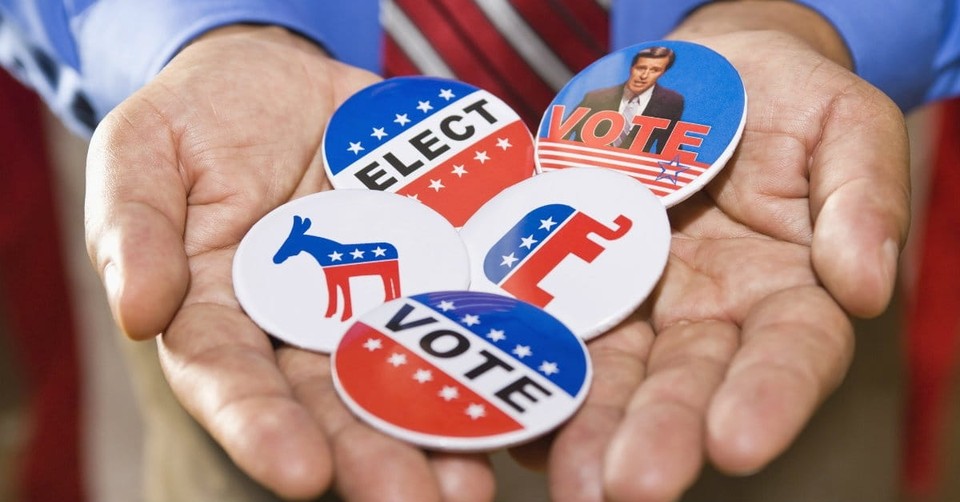7 Things Christians Should Remember about Politics

My hope is in You, Lord.
I whisper this refrain to myself, again and again, hoping to soothe my ruffled feathers. Trying to counter the turmoil I feel when faced with vehement opinions that seem false to me. When I witness hatred and stubbornness and a refusal to consider other perspectives. When political differences devolve into name-calling and harsh accusations.
My hope is in You, Lord.
When I don’t know what to think, Lord, my hope is in You.
When I don’t know how to reconcile my faith and my politics, my hope is in You.
When I don’t know how to reconcile other people’s faith and their politics, my hope is still in You.
Somewhere along the way, I turned my perpetual outrage into an idol. I’m a mess.
You too?
I think change starts with turning away from the need to be “right” and asking God to remind us of His Truth—which is bigger than this election and more permanent than any candidate or crisis. While I hope these resonate with you, more than anything, I’m talking to myself.
1. God is the King of Kings, the Lord of Lords.
Our ultimate allegiance is to God and God alone. He is God over all—no matter who is president. He’s remained God throughout history, and He will remain God when the election is over. In this country, and all around the world.
“‘And you shall love the LORD your God with all your heart, with all your soul, with all your mind, and with all your strength.’ This is the first commandment.” (Mark 12:30)
“The LORD is high above all nations, His glory above the heavens.” (Psalm 113:4)
2. God’s will cannot be thwarted.
God will bring to pass everything He has planned (see Daniel 4:34-35). People will abuse their power and use their influence in ways that harm others—ranging from innocent mistakes to purposeful evil, or simply being misguided or misinformed—but no one can waylay God’s plan. He is above all earthly power. Whatever happens, no matter how bad or devastating it seems, God can somehow bring good out of the situation. He can, and He does. And He will continue to do so.
“Yes, all kings shall fall down before Him; All nations shall serve Him.” (Psalm 72:11)
“And we know that in all things God works for the good of those who love him, who have been called according to his purpose.” (Romans 8:28)
3. We are defined not by who we vote for, but by Who we follow.
As Christians, our identity and self-worth are rooted in who God says we are—and He says we are forgiven. Chosen. Loved. Adopted. Welcomed. Justified and redeemed. Grafted into the vine. Heirs and co-heirs with Christ. We are God’s children. We can’t earn our place in His kingdom but we can let ourselves be changed by His love—and in turn, lavish it on others.
“See what great love the Father has lavished on us, that we should be called children of God!” (1 John 3:1)
“He predestined us for adoption to sonship through Jesus Christ, in accordance with his pleasure and will.” (Ephesians 1:5)
4. No single platform will ever fully represent the teachings of Jesus.
To be a Christian means, simply, to follow Jesus Christ. Each one of does that to the best of our ability, guided by our interpretations of the Bible—which doesn’t mention Democrats or Republicans, but instead warns of the Pharisees. Don’t buy into the rhetoric that insists you must vote a certain way if you are a Christian. Instead, ground yourself in the truth that we need to seek God first. Always.
“There is no one righteous, not even one.” (Romans 3:10)
“But seek first his kingdom and his righteousness, and all these things will be given to you as well.” (Matthew 6:33)
5. Another person’s bad behavior does not give us permission to sin.
We’re not instructed to counter hatred with more hatred, given justification to judge, or taught that it’s necessary to dislike those we disagree with. We are taught that our behavior and responses to what we encounter matter to God, and they’re the only things we have any control over. We need to hold ourselves accountable and seek God’s wisdom and discernment.
“Do your best to present yourself to God as one approved, a worker who does not need to be ashamed and who correctly handles the word of truth.” (2 Timothy 2:15)
“Do not judge, or you too will be judged… Why do you look at the speck of sawdust in your brother’s eye and pay no attention to the plank in your own eye?” (Matthew 7:1-3)
“I urge you, brothers and sisters, to watch out for those who cause divisions and put obstacles in your way that are contrary to the teaching you have learned. Keep away from them. For such people are not serving our Lord Christ, but their own appetites. By smooth talk and flattery they deceive the minds of naive people. Everyone has heard about your obedience, so I rejoice because of you; but I want you to be wise about what is good, and innocent about what is evil.” (Romans 16:17-19)
6. Jesus calls for Christians to live in unity.
In John chapter 17, Jesus thanked the Father for the ones God had given him, then declared that by the unity of those believers, others will know that the gospel is true. Christians should be more concerned with what we have in common than what divides us. I’m not advocating that we become Stepford Christians; I’m convinced Christians can have different opinions and still be Christians. But I do believe that the way we treat others has a tremendous impact on how non-Christians view our faith (and whether they want it for themselves). The accusations we’re slinging, the division we’re showing, and our general squabbling has called the authenticity of our faith into question.
“I urge you to live a life worthy of the calling you have received. Be completely humble and gentle; be patient, bearing with one another in love. Make every effort to keep the unity of the Spirit through the bond of peace.” (Ephesians 4:1-3)
7. We are not without hope.
It’s easy to get caught in the emotions and controversies of the day, but the word grounds us and points us back to God.
“Do not put your trust in princes, in human beings, who cannot save… Blessed are those whose … hope is in the Lord their God.” (Psalm 146:3, 5)
“My hope is in You, Lord.” (Psalm 39:7)
Even if we know all of this in our heads, our hearts may be slower to follow. So where do we go from here?
We go where we should always go, where in an ideal world we would turn first—to God. The author of love. The One who made us all so different from each other—and yet still in His image. The One who declared that we are to love God first, and to love our neighbors as ourselves. The One who holds the future—of this country, of our lives, of past and present and all of eternity—in His powerful, capable hands.
And we pray.
“If my people, who are called by my name, will humble themselves and pray and seek my face and turn from their wicked ways, then I will hear from heaven, and I will forgive their sin and will heal their land.” (2 Chronicles 7:14)
And give thanks.
I thank You, God, that my hope is in You.
Kelly O’Dell Stanley is the author of Praying Upside Down and Designed to Pray. A graphic designer who writes (or is it a writer who designs?), she's also a redhead who’s pretty good at controlling her temper, a believer in doing everything to excess, and a professional wrestler of doubt and faith. She blogs at kellyostanley.com and calls small-town Indiana her home.
Publication date: October 17, 2016
Originally published October 17, 2016.




